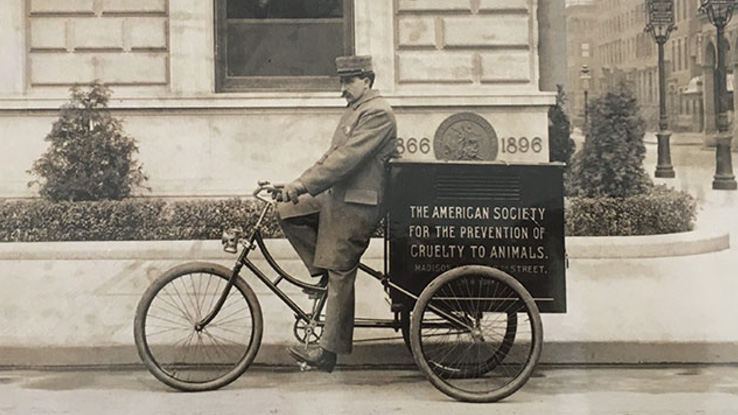
Libraries partners with ASPCA on large-scale digitization of animal welfare materials

The NCSU Libraries and the American Society for the Prevention of Cruelty to Animals (ASPCA) are honored to receive a major grant award from the Council on Library and Information Resources (CLIR).
The Libraries will partner with the ASPCA on the three-year project "'The Animal Turn': Digitizing Animal Protection and Human-Animal Studies Collections." A $360,384 Digitizing Hidden Special Collections and Archives award from the CLIR will fund the digitization of some 239,000 pages of archival materials from the Libraries' nationally significant animal rights and welfare collections, and approximately 150,000 pages from the ASPCA's records documenting its history as a national leader in animal protection since its founding in 1866.
“The animal turn” describes the shift in scholarly interest in the growing field of human-animal studies which incorporates diverse and multidisciplinary components of animal advocacy discourse housed in the Libraries’ collections and the ASPCA’s records.
Together, these important historical materials will become available to users and researchers through a single online access point, forming an unprecedented resource on human-animal studies that emphasizes the intersectionality between humans and non-humans. The ASPCA records, along with the Libraries’ holdings, will help scholars piece together a more complete historical narrative about animal protection and human-animal studies, and will allow researchers to identify new historical connections within the field.
“We are honored and excited to have been awarded this grant from CLIR,” says Gwynn Thayer, Acting Department Head of Special Collections at NCSU Libraries. “We are especially thrilled to be partnering with the ASPCA. We believe that the archival materials that will be digitized during the next three years will allow scholars from NC State as well as around the world to have better access to important primary source materials that will help further scholarship in the field of human-animal studies.”
“This collaborative effort with the NCSU Libraries is an important step in documenting and safeguarding the ASPCA’s rich history and the legacy of our founder, Henry Bergh,” noted Elizabeth Estroff, Senior Vice President of Communications for the ASPCA. “We are thankful for this generous grant from the CLIR to ensure future generations have access to the ASPCA’s extensive history of progress and innovation in the fight against animal cruelty.”
Leading scholars in the field of human-animal studies have expressed their support and enthusiasm for the project. “This is a project of monumental scholarly and public significance,” University of Texas American Studies professor Janet M. Davis notes, adding that the partnership between the NCSU Libraries and the ASPCA is a “truly outstanding collaboration.”
“Until now, no archives or libraries have been designed to document non-human life in the way this project will,” writes University of Guelph professor Susan Nance. “The potential impact of this digitization project simply cannot be understated.” Nance observed that the project would “revolutionize” her field of research.
The former Chief of the History of Medicine Division of the National Library of Medicine, John Parascandola, also endorsed the project: “This project will support research in such diverse fields as history, philosophy, science and technology studies, sociology and animal studies.”
This project will digitize many materials in the Libraries’ key collecting area of Animal Rights and Welfare, housed in our Special Collections Research Center (SCRC). The ASPCA collection to be digitized includes annual reports, awards, manuscripts, photographs, publications and visual resources that document and provide insight into both the ASPCA’s history, development and growth as an institution, and its position as a leader in the field of animal advocacy and protection. The archives document the growth of the animal welfare movement through the lens and experience of the ASPCA, which was the first animal welfare organization in the country.
The Council on Library and Information Resources is an independent, nonprofit organization that forges strategies to enhance research, teaching, and learning environments in collaboration with libraries, cultural institutions, and communities of higher learning. Its Digitizing Hidden Special Collections and Archives awards program, which is generously supported by funding from The Andrew W. Mellon Foundation, supports the creation of digital representations of unique content of high scholarly significance that will be discoverable and usable as elements of a coherent national collection.